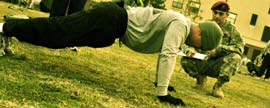I have never heard of an NCO being Relieved for Cause as a result of the Army Body Composition Program, unless that individual was in a Commander position or a CSM/1SG position. These positions are specifically addressed in the regulation. It may be possible for the Command to direct a relief for lower level leadership positions, but I believe to do so and be legally sufficient, the Command would need a legal opinion from the local JAG office. In your case, you state there may be a medical issue involved, and it may be related to a recent pregnancy. Recent revisions to AR 600-9 specifically address pregnancy and medical conditions. I would recommend you make an appointment with your local JAG to determine if proper procedures were followed and also determine if there was a violation of any protected status under AR 600-9 or federal law. You can request that the JAG give you a legal opinion concerning your case.
NCOER part IV- HT/WT—
The rater will comment on a “NO” entry, indicating noncompliance with the standards of AR 600–9, in part IV, block c. These comments should indicate the reason for noncompliance; medical conditions may be cited for noncompliance, however, the “NO “entry is still required because medical waivers to weight control standards are not permitted for evaluation report purposes. The progress or lack of progress in a weight control program will be indicated.–For pregnant NCOs, the entire entry is left blank. The rater will enter the following statement: “Exempt from weight control standards of AR 600–9.” Note. When using the Wizard application associated with the electronic form within the “My Forms” Portal on AKO, the APFT and height and weight statement will be combined.
Note: There will be changes to AR 623-3 in 2014.
AR 600-9
3-6a(1)(b) states:
Will not be assigned to command, command sergeant major, or first sergeant positions.
a. Personnel who meet this regulation’s standards and become pregnant will be exempt from the standards for the duration of the pregnancy plus the period of 180 days after the pregnancy ends. If, after this period of exemption they are verified to exceed the body fat standard, they will be enrolled in the ABCP, pending approval of a medical doctor that they are fit to participate in the program.b. Soldiers who become pregnant while enrolled in the ABCP will remain under the flagging action.c. Soldiers entered or re-entered in the ABCP after pregnancy will be considered first-time entries into the program; paragraph 3–14 will not apply at that time.
d. If the Soldier is determined to exceed the body fat standard and is identified to have a temporary underlying medical condition, refer to paragraph 3–11 for appropriate actions.
3–11. Temporary medical condition
a. All Soldiers found to exceed the allowable body fat standard will have a DA Form 268 initiated and be enrolled in the ABCP.b. Soldiers found to have a temporary medical condition that directly causes weight gain or prevents weight or body fat loss will have up to 6 months from the initial medical evaluation date to undergo treatment to resolve the medical condition. The medical specialty physician may extend the time period up to 12 months if it is determined more time is needed to resolve the medical condition. During this time, the Soldier will participate in the ABCP, to include initiation of a DA Form 268, nutrition counseling, and monthly body fat assessment, but will not be penalized for failing to show progress. However, if the Soldier meets the body fat standard during this timeframe, he or she will be removed from the ABCP.c. The provisions of this paragraph are not applicable to medical conditions or injuries based solely on a prescribed reduction in physical activity. The inability to exercise does not directly cause weight gain. Health care personnel will advise Soldiers to modify caloric intake when reduced physical activity is necessary as part of a treatment plan.d. Once the medical condition is resolved, or 6 months (not to exceed 12 months), whichever occurs first, from the date of the medical evaluation, and if the Soldier still exceeds the body fat standard, he or she will continue participating in the ABCP but will be required to show satisfactory progress, as defined in paragraph 3–9b. Health care providers will forward to the Soldier’s commander an updated memorandum stating the effective date that the Soldier’s temporary medical condition is resolved.
e. If the Soldier is unable to show satisfactory progress in accordance with paragraph 3–9b, the Soldier will be subject to separation.
Extract of AR 600-20
2–17. Relief for cause
a. When a SC loses confidence in a subordinate commander’s ability to command due to misconduct, poor judgment, the subordinate’s inability to complete assigned duties, or for other similar reasons, the SC has the authority to relieve the subordinate commander. Relief is preceded with formal counseling by the commander or supervisor unless such action is not deemed appropriate or practical under the circumstances. Although any commander may temporarily suspend a subordinate from command, final action to relieve an officer from any command position will not be taken until after written approval by the first general officer (to include one frocked to the grade of brigadier general) in the chain of command of the officer being relieved is obtained. Any action purporting to finally relieve an officer from any command position prior to the required written approval will be considered for all purposes as a temporary suspension from assigned duties rather than a final relief from command for cause. If a general officer (to include one frocked to the grade of brigadier general) is the relieving official, no further approval of the relief action is required; however, AR 623–3 concerning administrative review of relief reports remain applicable.
b. If a relief for cause is contemplated on the basis of an informal investigation under AR 15–6, the referral and comment procedures of that regulation must be followed before initiating or directing the relief. This does not preclude a temporary suspension from assigned duties pending completion of the procedural safeguards contained in AR 15–6. Any action purporting to initiate or direct a relief for cause on the basis of an informal investigation under AR 15–6 taken prior to completion of the procedural safeguards of AR 15–6 will be considered for all purposes as a temporary suspension from assigned duties.
Did you find this information useful? We appreciate your feedback!













